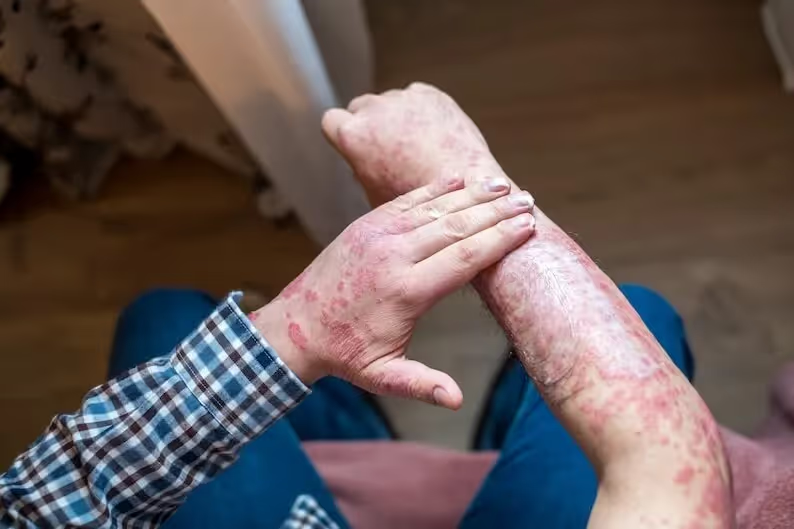Psoriasis, a chronic autoimmune skin condition characterized by red, scaly patches, can be challenging at any age. However, for older adults, managing psoriasis often comes with unique challenges and considerations. Let's explore triggers, treatments, and lifestyle modifications that can help manage symptoms effectively and determine if you can get psoriasis later in life.
Understanding What Psoriasis Is
Common psoriasis occurs when the immune system mistakenly attacks healthy skin cells, accelerating cell production. This leads to the buildup of cells on the skin's surface, forming scales and red patches that can be itchy and sometimes painful. Skin on the scalp, elbows, or knees are the most common areas affected, but other parts of the body can also become irritated. The condition is characterized by periods of flare-ups and remission and can range from mild to severe.
Types of Psoriasis
There are several types of psoriasis, each with distinct characteristics:
- Plaque Psoriasis: The most common form, accounting for about 80 to 90 percent of cases. It presents as raised, inflamed, red lesions covered with silvery-white scales, commonly found on the elbows, knees, scalp, and lower back.
- Guttate Psoriasis: Characterized by small, dot-like lesions, often starting in childhood or young adulthood. It can be triggered by a streptococcal infection.
- Inverse Psoriasis: Appears as smooth, red patches of inflamed skin, typically found in body folds like the armpits, groin, and under the breasts.
- Pustular Psoriasis: Presents with white pustules (blisters of noninfectious pus) surrounded by red skin. It can be localized to hands and feet or generalized over the body.
- Erythrodermic Psoriasis: A severe, potentially life-threatening form that leads to widespread redness and shedding of the skin. It can cause severe itching and pain and requires immediate medical attention.
Causes and Triggers of Psoriasis
The exact cause of psoriasis is still not entirely understood, but it is believed to involve a combination of genetic, immune system, and environmental factors:
- Genetics: About one-third of people with psoriasis have a family history of the condition. Certain genes are linked to an increased risk of developing psoriasis.
- Immune System: Psoriasis is an autoimmune disorder where T-cells, a type of white blood cell, mistakenly attack healthy skin cells. This leads to the rapid production of skin cells, causing the characteristic scaly patches.
- Environmental Triggers: Various factors can trigger or exacerbate psoriasis, including: Stress: Both physical and emotional stress can prompt flare-ups.
- Infections: Bacterial and viral infections, particularly streptococcal throat infections, can trigger guttate psoriasis.
- Medications: Certain drugs, like lithium, beta-blockers, and antimalarials, can induce or worsen psoriasis.
- Weather: Cold, dry weather can aggravate psoriasis, while sunlight can have a beneficial effect for some individuals.
- Lifestyle Factors: Smoking and excessive alcohol consumption can exacerbate psoriasis symptoms.
Understanding these aspects of psoriasis can help in managing the condition more effectively, particularly in older adults who may face additional challenges due to age-related factors and comorbidities. With appropriate treatment and lifestyle modifications, individuals can significantly improve their quality of life.
Effective Treatments for Psoriasis in Older Adults
Treating psoriasis in older patients requires a tailored approach, considering potential comorbidities and sensitivities to medications. Topical Treatments: - Corticosteroids: These anti-inflammatory creams are often the first line of defense. However, long-term use should be monitored to avoid skin thinning. - Vitamin D Analogues: Calcipotriene can slow skin cell growth and is often used alongside corticosteroids. - Moisturizers: Keeping the skin hydrated is crucial. Thick, fragrance-free creams are best. Phototherapy: Exposure to ultraviolet (UV) light can reduce symptoms for some. This light therapy is typically done under medical supervision to avoid skin damage. Systemic Treatments: For moderate to severe cases, oral or injected medications that affect the whole body might be necessary. - Methotrexate: This immunosuppressant can reduce skin cell production but requires regular monitoring for liver function and blood counts. - Biologics: Targeted therapies that block specific parts of the immune system. They can be effective but come with the risk of infections. Lifestyle Modifications: - Diet: An anti-inflammatory diet rich in fruits, vegetables, whole grains, and lean proteins can help manage symptoms. Some find relief by avoiding gluten or dairy, though evidence is anecdotal. - Exercise: Regular, moderate exercise can reduce inflammation and improve overall health. Swimming is particularly beneficial as it is gentle on the skin and joints. - Smoking Cessation and Alcohol Moderation: Reducing or eliminating smoking and heavy drinking can significantly improve symptoms.
Find Relief from Psoriasis with VIPcare
Living with psoriasis as an older adult involves understanding what psoriasis is and what triggers psoriasis flares. By adopting a comprehensive management plan, those affected can significantly improve their quality of life and minimize the impact of psoriasis. Always consult with healthcare professionals to tailor treatments and strategies to individual needs, ensuring the best possible outcomes. If you suffer from psoriasis, contact a VIPcare provider and get the relief you deserve.




